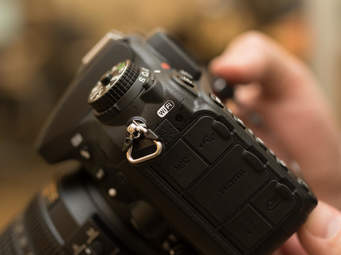It is increasingly common for those who want to enter the world of video to opt not for a camcorder but for a good camera to record video. This is basically because of the obvious reason that a video camera with video is more versatile than either of the two options separately (2 × 1), but mostly because they offer very good results at a more affordable price than a camcorder. same level. That said, and although we will see them in detail throughout the article, here is a list with some of the best cameras to record video. Just don't forget that it will be your personal needs that should make you opt for one or the other.
- Panasonic Lumix G7
- Canon EOS 200D
- Canon EOS 77D
- Sony A5100
- Sony A6300
- Olympus OM-D E-M10 Mark III
- Nikon D7500
HOW TO CHOOSE A CAMCORDER?
We always say that there is an ideal camera for each of us because it is true. Each of us and we have specific needs and aspirations (and a budget), so each purchase that we consider should never be made without answering some basic questions about our desires regarding what we are going to acquire.WHAT WILL I USE IT FOR?
It is the first question you should ask yourself, because all the purchase decisions you ask should be linked to this answer. I can think of three possible (very general) categories. But come on, the moral is that you are clear about what use you are going to give it, and then you can focus on the most relevant technical characteristics for you.- Extreme sports: in this case, maybe you should consider a GoPro or similar.
- The protagonists are the others: video clips, videos of our day to day, of our offspring, etc.
- Autovideos where we are the protagonists ourselves: YouTube tutorials, video courses like this one fromLightroom , or product reviews, like the ones Mario does on your youtube channel, etc. To give you an idea, I take and put this Mario tutorial on depth of field, a must.
- Camera for travel or more oriented to static situations? That is, do you want it to go with you to walk the world (light) and work well in situations where we do not control light and sound? Or will you record in controlled environments where weight is not something crucial and you can control the light and sound?
MAIN FEATURES TO CONSIDER WHEN CHOOSING A CAMCORDER
Let's see what you should look for to choose a camera that suits us:- HD or 4K recording: While it is true that 4k videos have a higher resolution and detail (since they have more pixels per inch), it is also true that all the files at the moment end up being consumed in HD. It would be (among many quotes) the RAW format of the video. More definition and more editing possibilities.
- Image stabilizer: to take into account especially if we plan to have to record scenes in low light or if we plan to work freehand.
- Folding screen: it can be very useful if, as I said before, your goal is to record yourself to make tutorials or videos from YouTube or similar. But it also allows you to record at different angles keeping the screen in sight.
- Camera with interchangeable lenses: they allow you the versatility of working with different focal lengths and playing, for example, with the aperture of diaphragm
- External microphone input: allows you to record audios with higher quality.
- Operation in low light situations (noise behavior at high ISO levels).
- Frames per second that influence the fluidity of the video image.
- Sensor size: the same as when we talk about photography, the sensor size influences the final image quality. Recording with a mobile phone is not the same as with a Full Frame.
- Autofocus system: especially if you are not going to be in charge of the camera, that is, if you are going to be in front and not behind, it will be necessary for you to have a good focus system that you can trust and follow you properly (a Face detection system, for example, can be very helpful).


